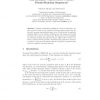Free Online Productivity Tools
i2Speak
i2Symbol
i2OCR
iTex2Img
iWeb2Print
iWeb2Shot
i2Type
iPdf2Split
iPdf2Merge
i2Bopomofo
i2Arabic
i2Style
i2Image
i2PDF
iLatex2Rtf
Sci2ools
ICANN
2005
Springer
2005
Springer
Can Dynamic Neural Filters Produce Pseudo-Random Sequences?
Abstract. Dynamic neural filters (DNFs) are recurrent networks of binary neurons. Under proper conditions of their synaptic matrix they are known to generate exponentially large cycles. We show that choosing the synaptic matrix to be a random orthogonal one, the average cycle length becomes close to that of a random map. We then proceed to investigate the inversion problem and argue that such a DNF could be used to construct a pseudo-random generator. Subjecting this generator’s output to a battery of tests we demonstrate that the sequences it generates may indeed be regarded as pseudo-random.
| Added | 27 Jun 2010 |
| Updated | 27 Jun 2010 |
| Type | Conference |
| Year | 2005 |
| Where | ICANN |
| Authors | Yishai M. Elyada, David Horn |
Comments (0)

